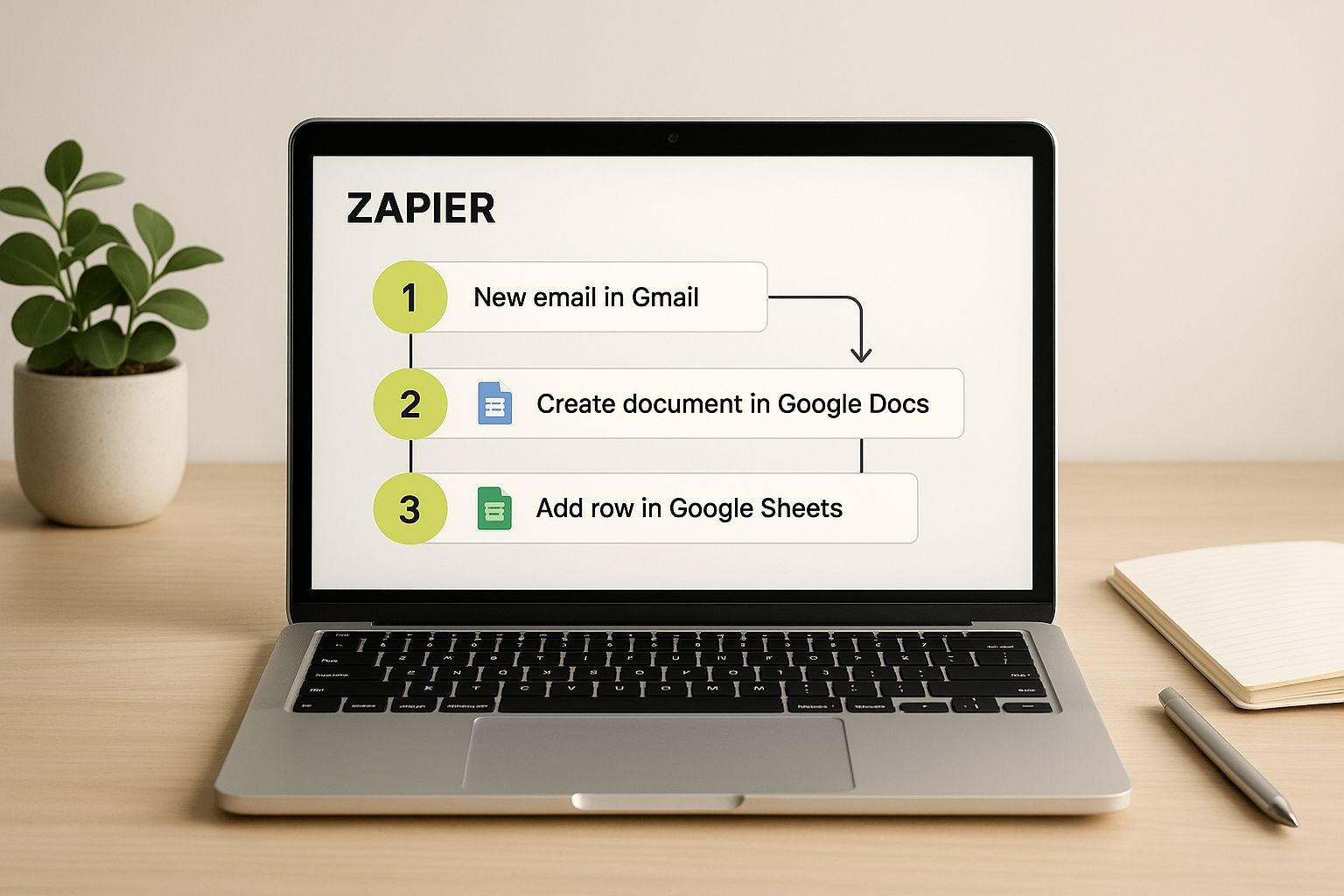
Your first 90 days as a startup founder are a mad dash of building, selling, and just trying to stay afloat. Let’s be honest, getting bogged down in admin isn’t just annoying—it’s dangerous. This is where a lean, smart ops stack built on Notion AI, Slack AI, and Zapier Agents becomes your secret weapon. Think of it less as a nice-to-have and more as a core survival strategy for any new UK startup.
This isn’t about flashy tech. It’s about building an integrated system that automates the grunt work, keeps your team’s knowledge in one place, and frees up the one thing you can’t buy more of: your time.
The first three months are a frantic race against the clock. You're not just launching a product; you're building a company from the ground up, often with a skeleton crew and a shoestring budget. This is where operational drag—all that time sunk into repetitive, manual tasks—can be fatal.
Weaving an intelligent ops stack into your business from day one isn't about chasing trends. It's about embedding efficiency into your company’s DNA right from the start.
The stakes in the UK are incredibly high. It's a fantastic place to build a tech business, home to 122 unicorn startups, but the reality on the ground is tough. The average five-year survival rate for startups here is just 42.4%, with a staggering 60% failing within the first three years. One of the biggest culprits? Running out of cash, which accounts for 38% of those failures, according to recent stats from Moneyzine.com. Every single pound and every hour you claw back through smart automation directly boosts your odds of making it.
To help you get started on the right foot, we've put together a full guide on how to start a business in the UK, which covers all the foundational steps you need to take.
A lean ops stack works on a simple principle: automate anything that doesn’t require uniquely human creativity or strategic insight. This philosophy allows a small team to punch well above its weight, delivering the output of a much larger company without the overheads. The combination of Notion AI, Slack AI, and Zapier Agents creates a powerful, interconnected system to make this happen.
Here’s a quick look at how each tool plays its part:
Let’s take a closer look at what this simple, powerful stack can do for your business in the crucial first three months.
To give you a clearer picture, here’s a quick summary of how these three tools fit together to support your UK startup from day one. This isn't just about efficiency; it's about building a resilient foundation that supports rapid growth without the corresponding increase in operational headaches.
By focusing on just these three tools, you create an operational nervous system that is affordable, scalable, and incredibly quick to get up and running. This strategic approach to your operations is what separates the startups that thrive from those that just about survive.
Information chaos is the silent killer of early-stage startups. When meeting notes live in one place, customer feedback in another, and your product roadmap is a figment of your co-founder's imagination, you're not just disorganised—you're burning precious time and energy just trying to stay aligned.
Enter Notion. Supercharged with its AI features, it’s the antidote. Think of it as your startup's central nervous system from day one.
Forget viewing Notion as just a fancy note-taking app. For a UK startup in its first 90 days, it becomes your single source of truth. It’s where your company culture begins to form, where your first sales processes are documented, and where your big ideas are broken down into something you can actually work on.
The real magic starts when you let Notion AI do the heavy lifting. Imagine finishing a 45-minute investor pitch practice session. Instead of someone spending another half-hour trying to summarise the key feedback points, you can just ask Notion AI to handle it.
Here’s how you can put Notion AI to work straight away:
Summarise the key decisions and action items. You get a clean, actionable list in seconds.Draft a simple remote work policy for a UK-based tech startup, and you have a solid template to refine. No more staring at a blank page.Create a project roadmap from these features with estimated timelines.This is what leaning on AI in your operations actually looks like. It’s practical, not futuristic.

The image above shows just how seamlessly Notion AI fits into your workspace, giving you contextual help that turns messy ideas into structured documents almost instantly. This isn't just about saving time; it’s a powerful tool for keeping up the momentum when you most need it.
By automating the initial drafting and summarising, you free up your brainpower. Instead of wrestling with formatting, you're focused on strategy, which is exactly where a founder's attention should be.
Let’s make this tangible. We're going to build two essential databases that every startup needs within its first few weeks. These aren't complex, enterprise-level systems; they are simple, effective tools built for the "get it done" mentality of a new venture.
Successfully implementing these early systems is a core part of a startup’s technology transformation. It sets the stage for more complex processes as you grow.
A simple CRM is a great place to start. Create a new Notion database with these properties:
Now, when you add a new lead, you can use Notion AI inside the page body to Draft a friendly follow-up email based on our last conversation about [topic].
Next, a content calendar is vital for your initial marketing push. Create another database with these fields:
Within each topic page, use Notion AI to Brainstorm five engaging headlines for a blog post about [topic] or Write three LinkedIn post variations for this topic.
By building these simple but powerful systems, you’re laying a structured, scalable foundation. Your Notion workspace evolves with you, ensuring the operational hub you build today supports your growth tomorrow, rather than holding it back.
Let's be honest: in the whirlwind first 90 days, Slack can quickly go from your startup's communication hub to a chaotic mess of endless pings and buried decisions. Don't let it become another source of noise. This is your chance to transform Slack from a simple chat app into an intelligent command centre using Slack AI.
By weaving in AI, you move from just reacting to messages to proactively managing information. Instead of your team wasting precious time scrolling through rambling channels to get up to speed, AI can serve up the highlights instantly. For a small, fast-moving team where everyone needs to be aligned without getting dragged into every conversation, this is absolutely crucial.
The aim here is simple: make information easy to find and even easier to digest. That way, critical client feedback, product ideas, and key decisions don’t get lost in the digital ether.
One of the most powerful things Slack AI does is summarise channels and threads. For a UK startup juggling product development, early marketing campaigns, and maybe even fundraising chats, this is a total game-changer.
Think about it. Your lead developer has been deep in code all morning. They don’t need to wade through two hours of back-and-forth in the #marketing channel. Instead, they can just ask Slack AI for the key takeaways. This simple habit could save each person 20-30 minutes a day. That adds up fast.
Here’s what that looks like in practice, turning cluttered chats into clear, scannable points.

This 'get up to speed' function is exactly what it sounds like – a way to condense streams of unread messages into concise bullet points. It means anyone can grasp the important outcomes of a discussion without having to piece it all together themselves.
You’re not just saving time; you’re preserving focus. When your team trusts they can get the highlights quickly, they're less likely to be distracted by the constant fear of missing out on important updates.
To make this tangible, let's walk through a few specific ways you can deploy Slack AI within your ops stack from day one. These aren’t just nice ideas; they’re practical workflows that tackle real challenges for new businesses.
Automated Daily Stand-ups: Set up a dedicated #standup channel. Then, create a workflow where Slack AI prompts everyone for their updates and posts a single, neat summary at 9:30 AM. You get the agile spirit without the meeting fatigue.
Intelligent Compliance Channel: For any UK startup, compliance is a big deal. Create a #compliance channel and link it to your Notion knowledge base. When someone asks, "What's our process for handling user data?", Slack AI can search and pull the relevant policy right from Notion into the channel. No more digging around.
AI-Powered Search: Slack's native search is decent, but AI search is on another level. Instead of guessing keywords like "investor deck," you can ask a natural question: "Find the final version of the pitch deck Sarah shared last week." The AI gets the context, saving you from frustrating and fruitless searches.
These aren't just messaging tricks; they turn Slack into an active participant in your operations. For UK businesses wanting to get a feel for the bigger picture, our guide on ChatGPT 5 and its use cases offers deeper insights into how this tech is reshaping industries. By putting these smart communication habits in place early, you’re building the foundation for a team that’s efficient, aligned, and ready to scale.
If Notion is your startup's brain and Slack is its nervous system, then Zapier is the magic that connects it all and gets things moving. This is where your ops stack truly comes to life, linking your tools to automate the repetitive tasks that drain your most valuable asset: time. Forget manual data entry; we're talking about building intelligent workflows that just work.
The entrepreneurial spirit in the UK is booming, with 801,006 new companies formed in 2022/23 alone, bringing the total to over 5 million. But operational agility is what separates the ventures that thrive from those that merely survive. You can discover more insights about the UK's resilient startup landscape at archimediaaccounts.co.uk. This is exactly why Zapier becomes a non-negotiable part of your first 90 days.
At its core, Zapier lets you create connections called Zaps. A Zap is basically a simple command: "When this happens in App A, do that in App B." For instance, you could build a Zap that automatically creates a new project page in Notion the moment a new client is tagged in a specific Slack channel. No more copy-pasting or forgetting to update your pipeline.
This is a simple but powerful example of how a trigger in one app can kick off a series of automated actions across your entire stack.

This kind of flow marks the end of manual updates. A single event becomes a seamless, multi-step process that keeps your systems perfectly in sync without you lifting a finger.
While Zaps are brilliant for rule-based tasks, the new Zapier Agents add a layer of AI-powered intelligence. Think of an Agent as a digital team member you can instruct in plain English to perform more complex, multi-step tasks across your apps.
For a UK startup, this is a game-changer. You could instruct an Agent: "Every morning, find the top three tech news headlines relevant to the UK fintech scene, summarise them, and post the summary in our #competitor-watch Slack channel." This isn't just automation; it's proactive operational support.
The real beauty is how simple it is to delegate these tasks. The conversational approach removes the technical barrier, allowing anyone on your team to build powerful automations without writing a single line of code.
Your goal in the first 90 days is to systematise success. Every manual task you automate with Zapier is one less thing that can fall through the cracks during the inevitable chaos of launching a business.
Let's get practical. To get you started, I've put together a list of high-impact automations you can build today to connect your stack and reclaim your focus. These are battle-tested workflows designed for the realities of an early-stage UK startup.
These simple workflows might seem small individually, but they create a powerful compound effect. By shaving off minutes here and there, you end up saving hours each week, all while ensuring your operational processes are consistent, reliable, and built to scale from day one.
A few more ideas to get you thinking:
#sales Slack channel.:notion:). When you react to a message in a #feedback channel with that emoji, a Zap instantly copies the message content into a "Customer Feedback" database in Notion.By putting these systems in place early, you're not just saving time—you're building a foundation for sustainable growth.
Having individual tools is one thing, but the real magic happens when they talk to each other. This is the moment you stop juggling a collection of apps and start building a proper operational nervous system for your startup. The goal here is end-to-end automation that handles the routine stuff, freeing you up to focus on the big picture.
Let's walk through a scenario every founder knows well: handling a new customer enquiry. This is the lifeblood of your business, and a slow or messy response can cost you a crucial early win.
Imagine a potential customer fills out the contact form on your website. Instead of that message just landing in an inbox, waiting for someone to notice it, an automated workflow kicks into gear instantly. This isn't some complex bit of engineering; it's a practical application of the first 90 days ops stack that saves time and impresses potential clients from the word go.
So, how does it all connect? Here’s a breakdown of how the tools work together, creating a seamless process that requires zero manual effort until it's time for that essential human touch.
The Trigger: A new form submission comes in. The first domino to fall is a notification sent straight to a dedicated #sales-enquiries channel in Slack. Now, your whole team has instant visibility.
The Agent's Role: A Zapier Agent is constantly listening in that Slack channel. As soon as the notification appears, it gets to work, parsing the message to pull out key details—the name, company, email, and the gist of the enquiry.
The Handoff: The Zapier Agent then shoots this information over to your sales pipeline database in Notion. A new entry is created, perfectly formatted, with all the fields populated and the status automatically set to "New Lead."
The AI Assist: This is where it gets really clever. Inside that new Notion page, you can prompt Notion AI to Draft a personalised follow-up email based on this enquiry, mentioning our key value propositions for a UK fintech startup. Within seconds, you have a solid first draft ready for a quick polish before you hit send.
The whole sequence takes less than a minute. What used to be a tedious series of manual copy-and-paste jobs becomes a single, fluid motion.
This level of integration isn't just about shaving off a few minutes here and there. It's about building a scalable, reliable process from day one. It guarantees no lead ever falls through the cracks and every potential customer gets a prompt, professional response.
As your startup grows, your web of automations will naturally get more complex. To avoid creating a digital mess, it’s vital to establish some simple ground rules from the start.
I recommend keeping a central log in Notion of all your active Zaps and Agents. For each one, just note down what it does, what triggers it, and what the outcome is. This simple bit of housekeeping prevents duplicate workflows and makes troubleshooting a whole lot easier when something eventually breaks.
This organised approach is especially critical in the UK's buzzing startup scene. Last year, over 846,000 new companies were registered, with sectors like fintech and AI technology seeing explosive growth. In fact, the UK is now home to around 20% of Europe’s fastest-growing tech startups, all fuelled by investment in AI and SaaS. A clean, effective ops stack isn’t just a nice-to-have; it's your ticket to competing in this fast-paced environment. You can read more about the UK's fastest-growing startup sectors on cgincorporations.com.
Diving into a new tech stack can feel like a huge leap, especially in the early days when every pound and every minute is precious. I get it. Most founders I talk to tend to circle around the same worries: cost, scalability, and just how long it's going to take to get everything up and running.
Let's tackle these head-on.
First up, the big one: money. The great thing about this Notion, Slack, and Zapier trio is that you can start incredibly lean. Each one offers a free or low-cost plan that’s more than powerful enough for a startup in its first 90 days. This keeps your cash flow healthy, which is critical when you're balancing all those other initial outgoings. For more on getting those early finances sorted, our guide on how to set up a business bank account is a great place to start.
Another very real concern is the time sink. You don't have weeks to spend tinkering with complex software. This stack is built for speed. Honestly, you can get your basic Notion workspace organised, your key Slack channels configured, and your first few essential Zaps live and firing in a single weekend. The goal here is immediate impact, not some drawn-out IT project.
The aim isn't to build a perfect, all-encompassing system from day one. It's about getting a 'good enough' foundation in place that solves your most painful operational headaches right now. You can then build and improve on it as you go.
Scalability is always on a founder's mind. Will the simple setup you create today turn into a bottleneck in a year's time? It’s a fair question.
The short answer is no. This combination of tools is trusted by businesses of all shapes and sizes, from one-person operations right up to global corporations.
The automations and databases you build now are designed to evolve with you. As your team grows and your processes become more sophisticated, you can simply upgrade to more advanced plans and build out more complex workflows. You won't have to rip everything out and start again. This means the groundwork you lay in your first 90 days ops stack will genuinely support your UK startup's growth for the long haul.
Ready to build a smarter, more efficient foundation for your UK startup? At GenTax Accountants, we specialise in helping tech-driven businesses like yours get their financial operations right from day one. Let us handle the numbers so you can focus on growth. Learn more about our accounting services for startups.